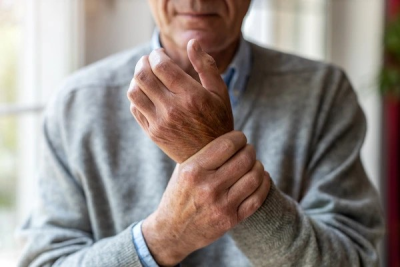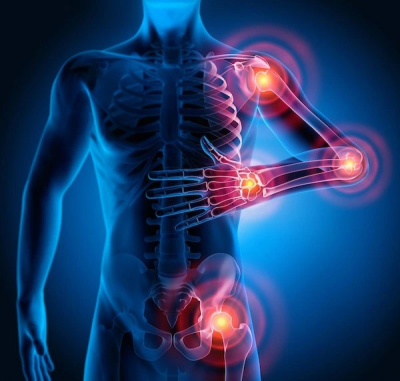What helps with rheumatism?
Author: Lucie Garabasova
Rheumatism is a disease that affects the joints, tendons, muscles, bones, and ligaments, leading to severe joint pain caused by cartilage breakdown. Together, we will take a detailed look at the topic of rheumatoid arthritis and find out what really helps with rheumatism. What are the suitable ointments and also home remedies for relief from unpleasant rheumatic pain.
What is rheumatism?
Rheumatism = rheumatoid arthritis is a chronic inflammatory disease that can affect not only your joints. In some people, this disease can damage a wide range of body systems, including the skin, eyes, lungs, heart, and blood vessels.
Rheumatoid arthritis is an autoimmune disease that occurs when your immune system mistakenly attacks your body's own tissues.
Unlike the wear-and-tear damage of osteoarthritis, rheumatoid arthritis affects the lining of the joints, causing painful swelling that can eventually result in bone erosion and joint deformity.
The inflammation associated with rheumatism can also damage other parts of the body. The disease cannot be completely cured; the treatment of rheumatism focuses on relieving the symptoms. In addition to using suitable ointments and herbs for rheumatism, physiotherapy is also beneficial.
What are the symptoms of rheumatism?
- tender, warm, swollen joints
- joint stiffness, usually worse in the morning and after inactivity
- fatigue, fever, and loss of appetite
Early rheumatoid arthritis tends to affect smaller joints first—particularly the joints that connect your fingers and toes. As the disease progresses, symptoms often spread to the wrists, knees, ankles, elbows, hips, and shoulders. In most cases, symptoms occur in the same joints on both sides of the body.
About 40% of people with rheumatoid arthritis also experience symptoms that do not involve the joints.
The areas that may be affected include:
- Skin
- Eyes
- Lungs
- Heart
- Kidneys
- Salivary glands
- Nerve tissue
- Bone marrow
- Blood vessels
Symptoms of rheumatoid arthritis can vary in severity and may even come and go. Periods of increased disease activity, known as flares, alternate with periods of relative remission—when swelling and pain fade or disappear. Over time, rheumatoid arthritis can cause joints to deform and shift out of place.
When to see a doctor
If you have persistent joint discomfort and swelling, make an appointment with your doctor.
Causes of rheumatism
Rheumatoid arthritis is an autoimmune disease. Under normal circumstances, the immune system helps protect the body from infections and illnesses. In rheumatoid arthritis, your immune system attacks the healthy tissue in your joints. It can also cause health issues with the heart, lungs, nerves, eyes, and skin.
Doctors don’t know what exactly triggers this process, although a genetic component seems likely. While your genes may not directly cause rheumatoid arthritis, they can increase your chances of responding to environmental factors—such as certain viral or bacterial infections—that may trigger the disease.
Risk factors
Factors that may increase the risk of developing rheumatoid arthritis include:
- Your sex. Women are more likely than men to develop rheumatoid arthritis.
- Age. Rheumatoid arthritis can occur at any age, but it most commonly begins in middle age.
- Family history. If someone in your family has rheumatoid arthritis, your risk may be increased.
- Smoking. Cigarette smoking increases the risk of developing rheumatoid arthritis, especially if you have a genetic predisposition to the disease. Smoking also appears to be associated with greater disease severity.
- Excess weight. People who are overweight appear to have a somewhat higher risk of developing rheumatoid arthritis.
Rheumatoid arthritis increases the risk of developing:
- Osteoporosis. Rheumatoid arthritis itself, along with some medications used to treat it, can increase the risk of osteoporosis—a condition that weakens bones and makes them more prone to fractures.
- Rheumatoid nodules. These firm lumps of tissue most commonly form around pressure points, such as the elbows. However, these nodules can form anywhere in the body, including the heart and lungs.
- Dry eyes and mouth. People with rheumatoid arthritis are more likely to develop Sjögren's syndrome, a disorder that reduces moisture in the eyes and mouth.
- Infections. Rheumatoid arthritis and many medications used to treat it can impair the immune system, leading to a greater risk of infections. Protect yourself with vaccinations to prevent illnesses such as flu, pneumonia, shingles, and COVID-19.
- Abnormal body composition. People with rheumatoid arthritis often have a higher fat-to-lean mass ratio, even if their body mass index (BMI) is normal.
- Carpal tunnel syndrome. If rheumatoid arthritis affects the wrists, the inflammation can compress the nerve serving most of the hand and fingers.
- Heart problems. Rheumatoid arthritis may increase the risk of hardened and blocked arteries, as well as inflammation of the sac surrounding the heart.
- Lung disease. People with rheumatoid arthritis are at increased risk of inflammation and scarring of lung tissue, which can lead to gradually worsening shortness of breath.
- Lymphoma. Rheumatoid arthritis increases the risk of lymphoma, a group of blood cancers that develop in the lymphatic system.
Home remedies: What herbs are good for rheumatism?
Our grandmothers used the following for joint pain:
- Horseradish – Mix four tablespoons of grated horseradish with 200 grams of grated fresh potatoes (squeeze out the liquid). Wrap the mixture in gauze and apply it to the painful area, which has been previously coated with lard. Leave it on for half an hour. If the skin turns red, wait at least three days before applying another compress.
- Ginger – Used in the form of tea or compresses for sore areas
- Comfrey – Ideal for ointments and compresses
- St. John's Wort – Specifically St. John's Wort oil
- Hemp – We must not forget the anti-inflammatory effects of CBD hemp, especially from Cannadorra
Does vitamin C help with rheumatism?
Vitamin C may have some positive effects on joint health and can help people with rheumatoid arthritis and other rheumatic conditions. Rheumatoid arthritis is an autoimmune disease that causes inflammation of the joints and can lead to joint damage.
Here’s how vitamin C may contribute to joint health:
- Antioxidants: Vitamin C is a powerful antioxidant that helps protect cells from damage caused by free radicals, which can contribute to joint inflammation.
- Collagen: Vitamin C is essential for collagen production, a protein that forms cartilage and connective tissue in the joints. A sufficient intake of vitamin C can help keep joints strong and flexible.
- Immune system: Vitamin C also supports the immune system, which is important in autoimmune conditions like rheumatoid arthritis.
Although vitamin C may be beneficial for people with rheumatoid arthritis, it is important to keep in mind that it cannot cure the disease on its own.
How does CBD affect rheumatism?
CBD influences brain activity, but not in a psychoactive way (like THC). CBD interacts with two receptors, called CB1 and CB2, which reduces pain and the effects of inflammation.
CB2 also plays a role in the immune system. In cases of rheumatism, your immune system attacks the tissue in the joints. This connection to the immune system could explain why CBD works well on rheumatic symptoms (especially pain and swelling).
Additionally, the anti-inflammatory effects of CBD might also help slow down or stop the progression of rheumatism, which over time causes permanent joint damage. These effects could also reduce some of the other inflammation-related symptoms, such as fatigue and fever.
CBD can be taken in the form of drops, capsules, or CBD gels. The best option is a combination – applying gels and taking drops (or using capsules).
Which ointment is suitable for rheumatism?
Ointments with non-steroidal ingredients can be used for rheumatism, but it is much more effective to use natural ointments – preferably with comfrey, which helps to relieve pain and inflammation. An ideal remedy is, for example, a CBD cooling gel.
Which tea is suitable for rheumatism?
You can make tea (infusion) for rheumatism from any herbs used for this condition – ginger, St. John's wort, or anti-inflammatory hemp tea. At Cannadorra, you can choose from approximately 12 types of hemp teas.


